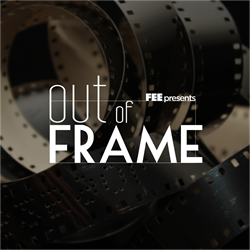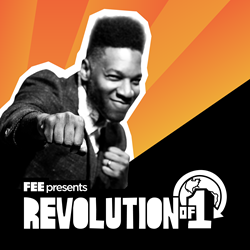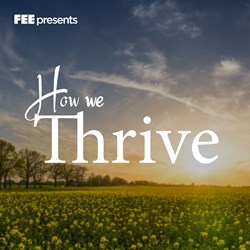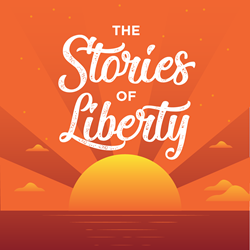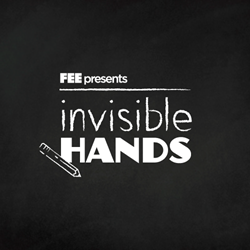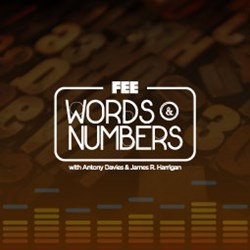INT. STUDIO - DAY
A young, energetic man, KEVIN LIEBER, stands in an open bright space behind an attractive desk.
Pedestals and shelves are arranged behind him with a series of PROPS ― a giant pencil, busts of important economists, globes and other object signifying economics. More objects adorn the desk.
There is also a GREENSCREEN "blackboard" and an attractive ILLUMINATED SIGN with the Foundation for Economic Education logo on it in the background.
SCENE 01: INTRODUCTION
We see a quote on the chalkboard in the background. It reads:
"The propensity to truck, barter and exchange one thing for another is common to all men, and to be found in no other race of animals."
― Adam Smith
KEVIN
(excitedly, to camera)
Hello, Kevin here! Welcome to "Invisible Hands", the series that makes economics easy and helps you see the beauty of trade and cooperation.
FIONA the puppet pops into frame.
FIONA
With meeeee, Fiona!
Kevin smirks, rolling his eyes in her direction.
KEVIN
We're going to cover a lot of ground in these videos, but before we can get to some of the more difficult ideas in economics, it's super important to start with the fundamentals.
(to Fiona)
You with me?
FIONA
Yep! Where do we begin?
KEVIN
Well… What do you think Economics is all about?
FIONA
The stock market?
KEVIN
Nuh uh.
FIONA
Money and business?
KEVIN
Sort of...
FIONA
The study of animals that may or may not exist.
KEVIN
That’s cryptozoology.
FIONA
Okay but what if you hire Bigfoot?
KEVIN
Take a picture of him that isn’t blurry, and we’re getting closer...
FIONA
Awwww... I give up! What's it about?
KEVIN
It's about p―
PROFESSOR FERGUSON pops into frame!
PROFESSOR
People!
SCENE 02: ECONOMICS IS PEOPLE
We see TEXT on the blackboard that reads: "Economics is about people!"
KEVIN
(confused)
Uh. Yes.
(beat)
Wait... Were you just hiding under the table the whole time?
The Professor looks around.
PROFESSOR
Well... Yes.
(to Fiona)
Fiona, economics is actually the study of human behavior ― whenever people make choices. That can be about money and business, sure... But it's also about so much more!
FIONA
(a little sarcastically)
Exciting.
KEVIN
(earnestly)
It is!
(to camera)
But just because it's a huge subject doesn't mean Economics can't be easy to understand. And to help you figure all this out there are six fundamental concepts you need to understand first.
FIONA
Yeah? What are they?
KEVIN
Individual action, scarcity, choice, tradeoffs, subjective value, and incentives.
FIONA
Got it! I guess we’re done here!
KEVIN
Yeah!
We hear the clang of all the lights going out at once.
SMASH CUT TO
BLACK
Two Seconds of total darkness.
CUT TO:
SCENE 03: INDIVIDUAL ACTION
The lights come back on. We're back in the studio. New TEXT is on the blackboard:
"Only the individual thinks. Only the individual reasons. Only the individual acts.”
― Ludwig von Mises
KEVIN
Wait, wait, wait. We have to explain all those ideas!
(to the Professor)
And by “we” I mean… Professor?
PROFESSOR
Alright!
(to camera)
The first thing to understand about economics is: Only individual people act.
Text appears on the chalkboard behind the Professor. It reads: “INDIVIDUAL ACTION”
FIONA
(interested)
Hmm.
PROFESSOR
And as individuals, the reason we act is in order to satisfy our own unique desires and values.
KEVIN
So, action is purposeful behavior.
PROFESSOR
That's right. We can imagine a better future, and we believe that our actions will make that future come true.
We CUTAWAY to an ANIMATED CARTOON version of FIONA in a college library, studying for an exam. The scene changes as she describes her decision-making process.
She works out the lesson in VOICEOVER.
FIONA
(V.O)
Oh, okay... Like when I'm doing my homework and I get hungry, it means I'm not content with my situation any more.
PROFESSOR
(professorially)
Go on...
FIONA
(building confidence)
Then I start imagining a better future. One where I'm not hungry anymore. And an astronaut.
KEVIN
Uh huh...
FIONA
And so if I can think of some way to get food...
PROFESSOR
What do you do?
FIONA
Order a pickle & pineapple pizza?
Everyone laughs.
PROFESSOR
Well... Why not?
KEVIN turns to camera to talk to the audience.
KEVIN
(to camera)
Speaking of pickle & pineapple pizzas, the fact that action is purposeful doesn't mean that everybody always makes great decisions and never makes any mistakes. But before you can understand economics, you have to understand the ‘why’ of human action.
FIONA
(interjecting)
And puppet action!
PROFESSOR
And you have to understand that the fundamental unit of analysis always comes back to the individual. Even though statistics and averages can help us understand some aspects of the world better, groups don't make choices. Individuals do.
SCENE 04: SCARCITY
The word "SCAR CITY" appears on the blackboard at the moment KEVIN says it.
KEVIN
The next thing you have to know is that one completely inescapable fact of reality is: Scar City. The City Of Scars.
(beat)
Wait, Sean. I'm think that's a typo. I'm pretty sure it's supposed to be scarcity, not Scar City.
The typo is fixed on the blackboard. It now reads "SCARCITY".
KEVIN
Ah, that's better.
(to camera)
Scarcity means two things.
A MOTION GRAPHIC replaces the text depicting the two points.
KEVIN
One, resources are limited and have many alternative uses, and two, people have virtually unlimited wants and needs.
FIONA
(to Kevin)
So... How often to people have to deal with scarcity?
Kevin looks to the PROFESSOR.
PROFESSOR
All. The. Time.
(beat)
The challenge of scarcity is why individuals have to be careful with how we use the resources at our disposal. Economics is about gaining a better understanding of the various ways we deal with scarcity.
KEVIN
Like production, consumption, exchange.
PROFESSOR
Exactly. If there was no scarcity then there wouldn't be any economic problems and nothing for us economists to study.
The Professor grumbles and shakes his head.
PROFESSOR
Horrid!
SCENE 05: CHOICE
KEVIN
Yep. Pretty much all human action involves coping with scarcity. And that brings us to: Choice.
TEXT appears on the blackboard. It reads: “CHOICE”
KEVIN
(to camera)
The unavoidable fact of scarcity forces individuals to make choices. You can't do your homework and go get a pizza at the same time. Unless your homework is to pick up a pizza… In which case, what class are you taking!?
FIONA
The best class ever.
KEVIN
(continuing)
Otherwise, you’ve got to decide which is more important to you.
We see an image of a Pizza with the pi(r^2) equation, showing the area of a circle.
FIONA
I never thought about it that way before.
PROFESSOR
Every choice you make comes at the expense of not being able to do something else.
KEVIN
(to Professor)
Yep.
(turning to camera)
In economics, these are called Trade offs.
PROFESSOR
Every decision we make in life is about balancing various trade-offs. Resources are scarce. So whenever we choose one course of action, we are giving up the opportunity to do something else. And this isn't just about money or material wealth. It's also about―
FIONA
―my time!
(beat)
So the point is, there are always going to be limits on what you can do with the resources you have, and competing opportunities to choose from. Economics can help you understand how to make better choices.
PROFESSOR
And by the way, no two people are ever going to make exactly the same decisions with the same resources.
KEVIN
Right.
SCENE 06: SUBJECTIVE VALUE
KEVIN
So, that brings us to to:
(dramatically)
Subjective Value.
We hear a loud echo on “Subjective Value”. TEXT appears on the blackboard. It reads: "SUBJECTIVE VALUE"
FIONA
Is your voice echoing?
KEVIN
Yeah, that always happens when I say “subjective value” for some reason. It’s been happening since I was a kid. My mom says it’s a genetic thing. I guess my uncle…”
PROFESSOR
(interrupting)
AHEM...
KEVIN
Oh right... Subjective Value is the recognition that everybody has different desires, wants, and needs, and the importance we place on them changes over time. Even moment to moment, in some cases.
(beat)
The things you value and how much you value those things depends on your goals, priorities, and personal preferences.
FIONA
Ohhh... Like how I might want a pickle and pineapple pizza when I'm hungry, but somebody else might want a peanut butter sandwich?
KEVIN
Yeah. Me!
(beat)
But it also means that just because you might value eating a pizza more than doing your homework right now, that doesn't mean you won't value doing something else once you're not hungry anymore.
PROFESSOR
Maybe you'll even go back to doing your homework!
FIONA
Ehhh...
KEVIN
The point is, everyone's preferences are constantly changing. And―
PROFESSOR
(finishing the sentence)
―"value" is a ranking of preferences, not just a number you can quantify. It's also not just about material "stuff". People value all kinds of abstract things as well.
KEVIN
Love, friendship, social status...
PROFESSOR
Good grades.
FIONA
And economics deals with all that stuff too?
KEVIN
Absolutely. It's also really important to understand that the value of a good is not just determined by the amount of effort, time, or material it took to make it.
FIONA
Really? Why not?
KEVIN
Because it doesn't matter how much work went into making a pickle & pineapple pizza... I don’t want it.
PROFESSOR
In general, the way we quantify how much people "value" something is by observing how much people are willing to give up to get it. And remember, this isn't just about money either.
FIONA
You’re talking about time again?
KEVIN
Absolutely. Think about people who camp out in front of a store on Black Friday―
FIONA
(she gets it)
―They might be saving money, but they're giving up their time instead!
(beat)
Why do people do that?
PROFESSOR
(shrugs)
Because they value the deal they think they're going to get more than they value the time they're spending waiting in line. You see?
FIONA
Value is subjective.
(beat)
Beauty's in the eye of the beholder, I guess. Got it.
SCENE 07: INCENTIVES
KEVIN
And that takes us all the way to our final fundamental concept: Incentives.
Text appears on the chalkboard. It reads: “INCENTIVES”
KEVIN
Since value is subjective, resources ― including your time ― are scarce, and the world is filled with trade-offs, making decisions can be tricky. But one constant fact of human nature is that we all respond to incentives.
PROFESSOR
(interjecting)
An incentive is something that motivates people to action -- and they can either be positive or negative.
FIONA
So just like I might get two pizzas if they're half off or how the prospect of getting a good tip motivates the delivery driver to get to me quickly, the fear of failing my classes encourages me to do my homework.
Kevin smiles at Fiona.
KEVIN
Yep. We'll talk a lot more about how incentives affect people's behavior in some of the other videos in this series, but all you need to know for right now is that incentives matter... A lot.
SCENE 08: FIONA'S SUMMARY
IMAGES on the blackboard support Fiona's review.
FIONA
Man, that was a lot to cover, but let me see if I understand everything.
KEVIN
Go for it.
FIONA
Ok. So... Resources are limited. We will never have enough time, money, or stuff to do everything we want to do at the same time. We’re all doomed to be miserable.
LOOONG beat as Kevin and the puppets reflect on the bleakness of life.
KEVIN
Yeah… Well... Scarcity is a fact of nature and it does mean we have to make some tough choices. But the beauty of the market is that it makes us way better off than we would ever be otherwise.
PROFESSOR
That's true.
FIONA
(continuing)
Ok, maybe we're not totally doomed. But people still have to make choices, and to understand why people do what they do, we have to look at individuals.
PROFESSOR
Yes. Only individual people make decisions and act on them. And they do that whenever they feel motivated to change their current situation.
KEVIN
Of course, it can be valuable to study group behavior, but in the end, every group is just a bunch of individual people working together. Economics is about individual action.
FIONA
And incentives motivate our actions and behavior in pretty predictable ways. Right, ok.
(beat)
So as far as economics is concerned, action is about individual people deciding to do things on purpose in order to get something they value?
KEVIN
Yep. And those values are―
FIONA
―Subjective!
KEVIN
Exactly!
FIONA
Whew! I think I get it. Thank you! Now I think I’m going to order a pizza. Who wants some?
KEVIN
(to Fiona)
You're welcome.
(to camera)
What about you? Did this help you understand the fundamentals of economics? If you have questions or just want to know more, leave a comment on this video and check out courses.FEE.org for tons of additional information. See you next time!
Kevin turns back to Fiona.
KEVIN
Wait... You’re a puppet, how do you eat pizza anyway? I mean, what are you going to do with it?
About this show
Popular YouTube host Kevin Lieber (VSauce2) hosts this informative and entertaining video series designed to introduce key concepts of economics to younger audiences through credible arguments, comedy... And puppets!
